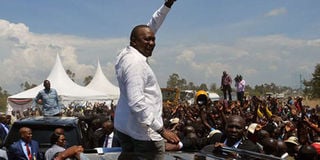Uhuru buoyant as experts question viability of healthcare plan

President Uhuru Kenyatta greets residents at Ahero, Kisumu County, on December 13, 2018. He launched the universal health scheme. PHOTO | ONDARI OGEGA | NATION MEDIA GROUP
What you need to know:
- Persistent strikes by nurses and doctors, lack of sufficient personnel in hospitals and possible uncoordinated services could undo the plan.
- Uhuru ordered the Health Cabinet Secretary to ensure there were proper institutions that will facilitate economic evaluation of investments in health.
President Uhuru Kenyatta yesterday vouched for the Universal Health Coverage programme, one of his Big Four legacy projects, amid fears of weak structures laid out for such a mammoth scheme.
Speaking in Kisumu, the President said that it was becoming a daily necessity for Kenyans to be assured of access to affordable medical care.
“My administration recognises the social and economic challenges that Kenyans face due to the rising cost of healthcare,” he said.
“The prohibitive cost of accessing health services has regrettably pushed at least one million Kenyans below the poverty line every year, with many others left at the brink of financial ruin,” he said while touting the UHC programme as the antidote to this challenge.
Partly funded by the World Bank to the tune of Sh2 billion, the pilot phase of the UHC will run in Kisumu, Nyeri, Machakos and Isiolo.
NHIF
The programme seeks to enhance access to medical services by the poor through a scheme where people are enrolled through the National Hospital Insurance Fund.
Eligible Kenyans will have to be registered by community health volunteers upon which a special card will be issued to access medical care. Each volunteer will be paid Sh2,000 per month.
Each of these counties will have targeted studies. For example, Kisumu will be key to learning how the programme can help reduce the burden of communicable diseases, while Nyeri is for non-communicable ailments.
Isiolo will focus on mortality rates while Machakos will experiment on reducing the burden of traffic accidents.
Government officials assert that the programme is not new, but complements already existing services such as subsidised services in public hospitals, abolition of fees as well as free maternity services.
STRIKES
Stakeholders said they supported the programme, but expressed worry over corruption loopholes and lack of clear statements on sustainability.
“We have not hired enough nurses. What would patients do if they have the card but have no nurses or doctors to attend to them?” Kenyan National Union of Nurses Secretary-General Seth Panyako posed.
Persistent strikes by nurses and doctors, lack of sufficient personnel in hospitals and possible uncoordinated services could undo the plan, he said.
Counties will run the programme with the national government providing policy oversight. But therein lies the problem, experts argue.
“How are we going to ensure the UHC works when we are still in a back-and-forth with our human resources?” Mr Kevin Osido, executive director of the County Governance Watch, posed.
While acknowledging the challenges, the President directed government officials to ensure effective distribution of drugs through the Kenya Medical Supplies Authority.
He ordered Health Cabinet Secretary Sicily Kariuki to ensure there were proper institutions that will “allow for the economic evaluation of investments in health and set tariffs that shall protect Kenyans from market exploitation”.






